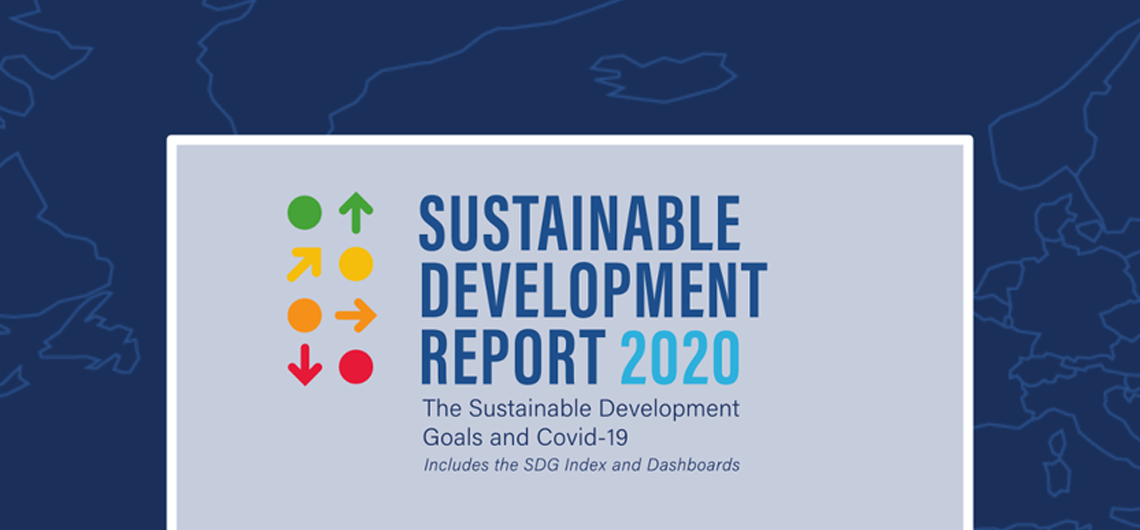Sustainable Development Report 2020

Covid-19 & the SDGs
Covid-19 has severe negative impacts on most SDGs.

The world is facing the worst public health and economic crisis in a century. As of June 20th, 2020, around 463,000 people had died from Covid‑19 across the world. The health crisis is affecting all countries, including high-income countries in Europe and North America.
The necessary measures taken to respond to the immediate threat of Covid‑19, including the shutdown of many economic activities for weeks, have led to a global economic crisis with massive job losses and major impacts especially on vulnerable groups. This is a significant setback for the world’s ambition to achieve the SDGs, in particular for poor countries and population groups.
The only bright spot in this foreboding picture is the reduction in environmental impacts resulting from declines in economic activity: a key objective will be to restore economic activity without simply restoring old patterns of environmental degradation. However, all long-term consequences of the pandemic remain highly uncertain at this point.
All countries need to strengthen the resilience of their health systems and prevention programs

Some countries have outperformed others in containing the pandemic, yet all remain at serious risk. No country has reached acquired so-called herd immunity; all remain highly vulnerable to new outbreaks.
In line withSDG 3 (Good Health and Well-Being), all countries need to “Strengthen the capacity for early warning, risk reduction and management of national and global health risks”. The Covid-19 pandemic has shed considerable light on the vulnerability of health systems, notably in high-income countries that were thought best prepared to face epidemics.
Besides greater investments, this crisis shows that better measures and reporting are needed to track prevention programs and health care system preparedness and resilience to pandemics.
The SDGs and the Six SDG Transformations can inform the recovery from Covid-19.
As the international community, regional organizations, and countries plan the post-Covid-19 recovery, it will be important to put the SDGs at the heart of policymaking. Covid-19 does not resolve the climate and biodiversity crises and is gravely amplifying income inequalities and other forms of inequalities.
It also demonstrates that countries will only be able to protect themselves from global pandemics if health systems are strengthened in every country. The SDR2020 shows that significant progress was achieved in many regions and on many goals over the past five years.

The SDGs and the Six SDG Transformations (Sachs et al., 2019) can guide the immediate post-crisis recovery and frame long-term strategies towards more resilient and sustainable societies.
Progress on the SDGs
Asian countries have progressed most on the SDGs since their adoption in 2015. Asian countries have also responded most effectively to the Covid-19 outbreak.
While the world as a whole made progress on the SDGs, countries in East and South Asia progressed the most on the SDG Index score since the adoption of the goals in 2015. Most countries in the region also managed the Covid-19 outbreak more effectively than other parts of the world. While the situation is still evolving, the shift of the geopolitical and economic global center of gravity from the North Atlantic region to the Asia-Pacific region is likely to be accelerated by the crisis.

Working Together
Solidarity and partnerships are critical to address and prevent health, economic, and humanitarian crises.
Globalization and the destruction of wildlife habitats facilitate the rapid spread of viruses around the world. Yet rather than losing the vast benefits of globalization for economics, poverty reduction, technological advance, and the enjoyment of each other’s cultures, it is important to make globalization more fair, sustainable, and resilient to shocks. Concerted international action by policymakers, business, civil society, and the scientific community can accelerate the identification of solutions to the immediate crisis and strengthen globalization for the long term. Stronger international and multisectoral partnerships can support mitigation strategies by sharing best practices and help prevent future disruptive events. The health, economic, and social crises call for increased international collaboration and solidarity to support the most vulnerable countries.
The report identifies five key measures that global cooperation should include:
- Disseminate best practices rapidly.
- Strengthen financing mechanisms for developing countries.
- Address hunger hotspots.
- Ensure social protection.
- Promote new drugs and vaccines.
Data Availability
Data gaps and time lags in official statistics require urgent investments in statistical capacity and increased coordination between governments and the private sector.
The epidemic has taught us again the value of real-time information and the enormous costs of flying blind in a storm. Early detection of Covid-19 outbreaks can make all the difference between suppression of the epidemic and a full-scale outbreak. The same is true across many SDG indicators, where timing matters enormously to save lives, ecosystems, and effective governance. This year’s edition of the SDG Index and Dashboards cannot integrate the impact of Covid-19 on the SDGs due to time lags in official statistics and reporting. This illustrates how crucial timely and disaggregated data are across the SDGs. Major efforts should focus on increasing data availability and reducing time lags in official statistics, and to leveraging the wealth of real-time data available from non-traditional sources including the research community and the private sector.

Explore Results
Explore the data from the Sustainable Development Report 2020 in our interactive dashboards.
Explore the SDR 2020 Dashboards
Source : Storymaps

